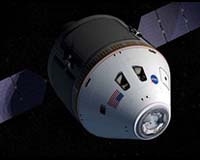 |
Washington DC (SPX) May 27, 2010 Identifying India as a 'big partner' of the US space programme, NASA has applauded the country's efforts in using its space missions for "societal needs." "I think it's 85 per cent of their budget is spent on what they call societal needs. It's earth science, climate change, those kinds of things, and they still insist that they're going to bring about a human space flight programme, you know, by 2020 or so," NASA Administrator Charles F Bolden said. Terming India as a big partner of the United States in its space programme, Bolden said "They (India) want that independent ability, but they still want to partner with us. They came back because they like what we do in terms of earth science and climatology. They like what we do in terms of planetary science. And they want to be a part of that." Last year in November, NASA's Lunar CRater Observation and Sensing Satellite mounted on India's Chandrayaan I got a major success when it discovered significant quantities of ice on the moon surface, paving way for future longer lunar missions. However, NASA has acknowledged that post 9/11 attacks, many Indian scientists chose to return home as they want to help develop the country's space technology and to live a hassle free life. "A lot of them are starting to do today is they're going back home. You know, especially Indians. They're saying, why should I go through this hassle? You know, I'm making a lot of money here in the United States, but I can go back to my own country and I can really make a difference. And the amount of money I make, I can live comfortably and I can help raise the status of my country technologically," Bolden said in response to a question. Meanwhile, terming NASA's contribution indispensable for space programmes of countries like South Korea, Japan, China and Russia - all of which want to have an independent and autonomous capability to carry out their missions, the NASA administrator said nations would like to partner US because a dominant nation can take care of everybody. Feeling the need of homegrown brain, Bolden said NASA can no longer depend upon expatriates as the technological workforce. "You know, we have lived like this for decades now, but they're starting to go home. We're starting to drive some of them home," he said at the Council on Foreign Relations, a Washington-based think tank. To entice youngsters towards science and technology, he said the concerned people need to send a message to kids that "science can be fun and engineering can be fun and that you can make a difference with that." Bolden also felt the need to bring in students from venerable communities because in "the minority communities, in black communities and Hispanic communities, if I can't get a young man through third grade, he's gone."
Source: Press Trust of India
Share This Article With Planet Earth
Related Links ISRO Space Tourism, Space Transport and Space Exploration News
 Aerojet Validates Engine Design For Orion Crew Exploration Vehicle
Aerojet Validates Engine Design For Orion Crew Exploration VehicleSacramento CA (SPX) May 24, 2010 Aerojet has completed a second set of hot-fire test sequences of its R-1E 25-pound thrust, bipropellant engine. This second test included more than 17,250 seconds of total burn time, demonstrating engine flexibility to operate under a broad variety of conditions expected for NASA's Orion service module. Initial test results indicate the engine performed successfully in simulated space-flight mis ... read more |
|
| The content herein, unless otherwise known to be public domain, are Copyright 1995-2010 - SpaceDaily. AFP and UPI Wire Stories are copyright Agence France-Presse and United Press International. ESA Portal Reports are copyright European Space Agency. All NASA sourced material is public domain. Additional copyrights may apply in whole or part to other bona fide parties. Advertising does not imply endorsement,agreement or approval of any opinions, statements or information provided by SpaceDaily on any Web page published or hosted by SpaceDaily. Privacy Statement |